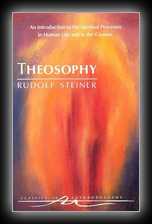
Theosophy - An Introduction to the Spiritual Processes in Human Life and in the Cosmos
by Rudolf Steiner
1922
THE SOUL WORLD OUR study of man has shown that he belongs to three worlds. From the world of physical corporality are taken the materials and forces building up his body. He has knowledge of this world through the perceptions of his external physical senses. Anyone trusting to THESE senses ALONE, and developing his perceptive abilities alone, can gain for himself no enlightenment concerning the two other worlds, the SOUL and the SPIRITUAL. A man's ability to convince himself of the reality of a thing or a being depends on whether he has an organ of perception, a sense for it. It may, of course, easily lead to misunderstandings if one call the higher organs of perception spiritual SENSES, as is done here, for in speaking of "SENSES" one involuntarily connects with them the thought "physical." The physical world is in fact designated the "sensible," in contradistinction to the "spiritual." In order to avoid this misunderstanding, one must take into account that "higher senses" are spoken of here only in a comparative or metaphorical sense. As the physical senses perceive the physical world, the soul and spiritual senses perceive the soul and spiritual worlds. The expression "sense" will be used as meaning simply "organ of perception." Man would have no knowledge of light and color had he not an eye able to sense light; he would know nothing of sound had he not an ear able to sense sound. In this connection the German philosopher Lotze rightly says, "Without a light-sensing eye, and a sound-sensing ear, the whole world would be dark and silent. There would be in it just as little light or sound as there could be toothache without the painfeeling nerve of the tooth."
